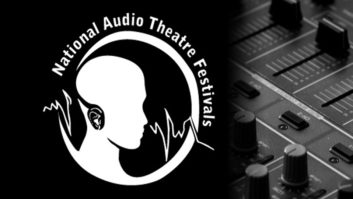
Personal collection of Norman Corwin
On a Sunday evening in New York in October of 1938, Norman Corwin labored over a program he was about to direct in a live broadcast for his new employer, the Columbia Broadcasting System.
It had been six months since CBS hired the former journalist to direct and produce a soap opera and three weekly series of dramatizing science, living history and citizens at work.
The 28-year-old Corwin toiled quietly. However, the floor below his Madison Avenue studio was the scene of a swirl of activity. Orson Welles and his Mercury Theatre of the Air were broadcasting their pre-Halloween version, as Welles phrased it, of “dressing up in a sheet … and saying ‘Boo!’”
Corwin’s own program, which immediately followed the panic-inducing “War of the Worlds,” went off uneventfully. He then left the building, unaware of what had occurred earlier — until he read the newspapers the next day.
He recalled the evening wryly: “Orson Welles and crew had emptied all the living rooms of America, so that my broadcast, I’m sure, was heard by a very small audience.”
Quick study
Corwin, the rookie radio dramatist, was undaunted. He went on to experiment with story-telling techniques like cold openings, perfecting his writing talents in many media and earning the nickname of radio’s poet laureate.
His career work has won him honors including two Peabody Awards and a place in the Radio Hall of Fame. Naming him a Giant of Broadcasting in 2010, the Library of American Broadcasting said Corwin is “considered one of the greatest writers in the English language” and saluted him as being “among the first producers to regularly use entertainment to address serious social issues.”
Corwin, 100 years old, lives in Los Angeles, where Radio World asked him to share some of his memories.
He had limited radio experience at the time CBS hired him — a series of 15-minute experimental dramatizations of poetry over a Long Island station — and was still learning his way around a network control room. A Boston-born journalist, he had come to radio by writing critiques as radio editor of the Springfield Republican in Massachusetts. Later he did radio publicity for 20th Century-Fox in New York.

Norman Corwin directs a dress rehearsal in a CBS studio of the late 1930s or early ’40s. Note sound effects gong at left. Personal collection of Norman Corwin CBS was an underdog nipping at the heels of the giant National Broadcasting Company; but it had airtime with which to experiment. In the ’30s, about two-thirds of its schedule had no sponsors, according to an estimate by historian Leroy Bannerman. The network took public service seriously, was looking for new ideas and had a bent toward quality.
For example, “Columbia Workshop,” a prestigious weekly network program, provided directors and writers a stage on which to demonstrate their best work. NBC may have had entertainers like Jack Benny and Bob Hope; but CBS appealed to the serious-minded listener. To media historians, the 1930s and ’40s nurtured a bloom of innovative, imaginative network programming heralded as the Golden Age of Radio.
Programming executives at CBS like William Lewis and Douglas Coulter recognized Corwin as a quick study and gave him airtime to spread his writer’s wings. Lewis even suggested christening a new poetry series “Norman Corwin’s Words Without Music,” a proprietary honor for a fledgling writer-director.
During his first year Corwin was assigned to adapt Stephen Crane’s Civil War novel “Red Badge of Courage” for the Columbia Workshop. Other adaptations followed, as did an original script, a rhymed fantasy pitting Santa Claus against “some gory goings on in Hell.”
That program, “The Plot to Overthrow Christmas,” was broadcast on Sunday, Dec. 25, 1938. The next day, CBS’s top newsman entered Corwin’s 18th floor office and introduced himself. Edward R. Murrow, visiting from Europe and already a network icon, told the young broadcaster that he and Mrs. Murrow had greatly enjoyed the clever wordplay.
“He said they hadn’t had as much fun listening to verse since last hearing Gilbert and Sullivan,” Corwin recalled.
This came at a “psychologically right time,” he continued, “because I was beginning to despair over my lack of notice. I was thinking that if they didn’t like ‘The Plot to Overthrow Christmas,’ they wouldn’t ever like anything I did. Murrow’s acclamation turned that (thinking) around.”
Famous friends
Their meeting launched an enduring friendship and birthed collaborations between the men, both of whom would be drawn into the vortex of war.
Corwin’s simmering anger at the aerial bombing of Spanish civilians in Guernica, and later of Ethiopians by Italian invaders, came to a boil in an anti-fascist play sarcastically titled “They Fly Though the Air With the Greatest of Ease.” Broadcast in February 1939, it launched the “Words Without Music” series.
(click thumbnail)
Corwin worked with Hollywood’s brightest talents during radio’s golden era. In 1943 he’s shown preparing for “Passport for Adams,” with writer Ranald MacDougall, left, and actor Robert Young. Elsa Lanchester and her husband Charles Laughton worked with Corwin, here in the mid-1940s; and Glenn Ford cups his chin during rehearsal, probably for “Savage Encounter,” in August 1945. Personal collection of Norman Corwin This calmly poetic but critical portrayal of a bomber crew’s attitudes toward their helpless victims was received warmly by the public and many critics. A career landmark, “They Fly Through the Air” won the then-highest radio honor for an individual drama in the country, the Ohio State Institute for Education by Radio award. CBS had neither censored his political poetry nor raised major complaints, he recalled, burnishing its reputation for liberalism.
“The network took bows for my work,” he said.
One of the first major film stars he employed was Academy Award winner Charles Laughton, who was recruited for a Corwin adaptation of Stephen Vincent Benet’s epic prose poem “John Brown’s Body.” An expert in British drama and poetry, the actor “knew nothing of American poets,” said Corwin. “I introduced him to Walt Whitman, Thomas Wolfe and Carl Sandberg, and he was thunderstruck.”
They worked together so well that Corwin was invited to stay with Laughton and his wife, actress Elsa Lanchester, whenever he visited Los Angeles.
Laughton, for his part, was so taken by Whitman’s powerful poetry that when Corwin eventually cast him as the poet in a radio play, the actor came up with an unusual approach to his role: He copied the 36-page typescript in longhand.
When Corwin asked why, Laughton gave a “long, quasi-occult explanation” that this would allow him to embed the emotions subconsciously and better master the poet’s language. “I thought it was a lot of trouble to test a theory,” Corwin said.
Their friendship was mutually beneficial. During one of his visits, actress Ruth Gordon was a dinner guest. Her table banter with Lanchester was scintillating; the writer transformed it into a satirical fantasy on consumerism titled “Mary and the Fairy.” When produced as part of the CBS series “26 by Corwin,” Lanchester and Gordon naturally voiced the lead roles.
The Laughtons’ regard smoothed Corwin’s access to other film stars for his radio programs, including a live 1941 celebration of the 150th anniversary of the Bill of Rights.
The unprecedented broadcast over all four networks came eight days after the Japanese attacked Pearl Harbor. “We Hold These Truths” featured James Stewart as the everyman narrator and gave lines to Lionel Barrymore, Walter Huston, Marjorie Main, Edward G. Robinson and Welles, among others. Appended to the drama about protecting freedom were eight minutes on the war by President Franklin D. Roosevelt.
‘Happy productions’
With America combating powerful enemies across two oceans, Corwin was asked in 1942 to direct and write radio programs on why the country fought and whom its allies were. The realistic “This Is War” series also introduced him to actress Katherine Locke, his future wife.
Sympathy and understanding of American allies were frequent themes during World War II. “An American in England,” which Corwin wrote and directed on location, was co-produced by Murrow, who occasionally acted in the CBS series. Another series Corwin directed, “Passport for Adams,” featured film actor Robert Young, who would become a television star as Marcus Welby, M.D.
“Mine were happy productions,” Corwin recalled. “The actors trusted me, and I treated them as collaborators. Many stars worked for me for scale.”
A stock company formed around Corwin at CBS and included House Jameson, Eric Burroughs, Martin Gabel, Hester Sondergaard and Everett Sloane.
Bernard Herrmann was a prolific and preferred composer of the music undergirding many of Corwin’s plays. He composed for 1945’s widely hailed masterpiece, “On a Note of Triumph.” Martin Gabel narrated the hour-long, cautiously celebratory program broadcast the day the Nazis surrendered in Europe. An estimated 60 million people listened.
Corwin’s caution was due, in part, to the fact that war with Japan raged on. He also wanted to provoke questions about what had actually been learned from World War II that could be applied to prevent future wars.
With far less planning, “August 14,” a 15-minute program saluting Japan’s surrender, used a single voice to probe the future of nuclear weapons. Welles narrated what Corwin had stitched together the night before. Welles had been broadcasting war news for 36 straight hours on another Los Angeles station when he answered Corwin’s summons.
Five days later Welles and film actress Olivia de Havilland performed an expanded version of the V-J Day broadcast called “God and Uranium.”
In 1946, Corwin was awarded a major prize to circumnavigate the planet to promote peaceful world unity. He wanted it to be a journalistic working trip; CBS agreed.


The California Artists Radio Theatre saluted Corwin last spring. CART announcer John Harlan takes the mic to welcome Corwin to a birthday tribute at which CART staged his “Mary and the Fairy” and “Our Lady of Freedoms.” Photo by Vic Cox The four-month, 37,000-mile odyssey took the radio writer and his soundman to 17 countries. Consequently, CBS broadcast a 13-part series of radio documentaries based on Corwin’s interviews of prime ministers, artists, laborers and the woman-on-the-street.
Time magazine noted that the first broadcast “at its many high points … had a sudden, heady power.” His expanded journal of the trip was published in 2009 as the book “Norman Corwin’s One World Flight.”
‘Radio left me’
Post-war peace brought widespread commercialization to CBS programming, which viewed television, not radio, as its future cash cow.
Corwin heard Chairman William Paley emphasize the need to “broaden the audience” and deduced what that meant for him. When CBS offered a new contract in 1948, its terms were so restrictive Corwin felt “they didn’t want me back.”
It spelled the end of radio’s Golden Age for Norman Corwin, though he took a part-time position directing a unit for United Nations Radio for the next few years while he turned his mind to creating books and films. He was nominated for an Oscar for a movie script about Vincent van Gogh; he wrote and directed two plays produced on Broadway. The writer-director whose work appealed to the rank and file as well as the rich and famous is no longer heard regularly on radio, though NPR embraced him briefly in the late 1990s.
Once called the “Bard of Broadcasting” by historian Studs Terkel and today still lauded as the Golden Age of Radio’s poet laureate, Corwin has taught the writing crafts for 30 years at the University of Southern California. He believes that being in touch with young, inquiring minds has contributed to his long and productive life.
Corwin has repeatedly said, “I didn’t leave radio; radio left me.” He described the seismic shift in network radio and how it affected his métier as like having a great horse shot out from under him. At age 100 he said he is sad rather than bitter about the virtual extinction of radio drama.
However, his writing has continued through a dozen books and countless columns, essays and other projects. Thanks to the Internet and CDs, his radio plays live on. Radio Spirits recently released a 10-CD set of his early work; samples can be downloaded from a website, www.normancorwin.com, sponsored by Anthracite Films.
Norman Corwin still has many devoted fans and friends, as he discovered during celebrations hosted in his honor in the centennial year.
Among them was an event held by the Radio Enthusiasts of Puget Sound. It was the longest trip he has taken in years, and Corwin received standing ovations. “This old lion was properly lionized,” he said.
Vic Cox is a veteran independent magazine writer and author. His website is www.viccox.com.











